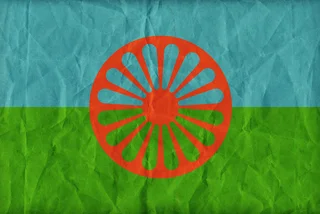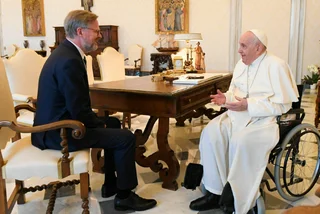The purchase of the pig farm in Lety, situated at the site of the WWII concentration camp for the Roma, was long and undignified, President Petr Pavel told reporters after a commemorative event in Lety Sunday. The president said Czechs should admit their part in this dark chapter of history.
The event, marking the 80th anniversary of the transport of 420 imprisoned Roma to the Auschwitz Nazi extermination camp, was attended by hundreds of people, including top state representatives, who laid flowers at the memorial.
PARTNER ARTICLE
Pavel is only the second Czech president after Václav Havel, who visited the site on this occasion 28 years ago, to attend the commemorative event.
"It is right and necessary to commemorate these events as a dark chapter of history, including our own," the president said.
The need to defend freedom and human rights is the same now as in the past, he said. "It seems to me that the humankind tends to repeat its mistakes," he added, referring to the current suffering of civilian inhabitants during the Russian aggression in Ukraine.
Pavel said that the purchase of the pig farm by the Czech government had taken a long time.
"It was long and undignified. I am glad that it turned out this way, I am glad that a memorial will be created here and that it will help highlight a part of history that we should not neglect, but on the contrary, we should clearly describe it and admit our share of guilt," he said.
That is the only way to deal with it, he added. At the same time, he said he considered the building of a memorial to the Roma Holocaust a signal of a sincere effort to rectify the situation.
Senate chairman Miloš Vystrčil said the opening of the Roma Holocaust memorial next year should be an opportunity to improve relations between the majority society and the Roma.
I would be very happy if the creation of this memorial would be another impulse for a dialogue. There are still prejudices among us, which, in my opinion, stem from ignorance," Vystrčil said.
He noted that he was sorry for the words that could have hurt Roma people being voiced in the Senate. referring to senator Jana Zwyrtek Hamplová's remarks about the segregation of Roma children at school in March. Vystrčil warned that even in democratic elections such tendencies can be encouraged.
Chamber of Deputies chairwoman Markéta Pekarová Adamová recalled that the prisoners at Lety had also been mistreated by Czech gendarmes, for which an apology should be expressed. In her opinion, it is important to use the commemorative event for reflection as well.
"Even in today's society here in the Czech Republic, there are many who still think in racist terms and discriminate against others. It is the duty of the rest of us to speak up against this," she added.
She also said she believed that Roma activist Čeněk Růžička, who had helped build the memorial, would receive a state decoration in memoriam from the president.
Jana Kokyová, chairwoman of the Committee for the Compensation of the Roma Holocaust in the Czech Republic and Růžička's niece, pointed out that similar human traits that had led to the Holocaust, i.e. feeling of superiority and hatred, were the reasons for the current war in Ukraine. Even today, Roma people are facing attacks, especially hateful comments on social media, she added.
The forced labor camp in Lety was opened in 1940. A similar facility existed in Hodonín in South Moravia. In 1942, both facilities became internment camps and in August of the same year, Roma camps were established there.

Until May 1943, 1,308 Roma men, women and children were interned there, 327 of whom perished in the camp and over 500 were sent to the extermination camp in Auschwitz where most of them died. According to estimates, the Nazis murdered 90 percent of Czech Roma people.
In the 1970s, a pig farm was built at the site of the Lety camp. The state purchased the farm in 2018 for CZK 450 million crowns from the Agpi company, which kept 13,000 pigs on it. The farm demolition was completed at the end of last year.
Instead, the Memorial to the Roma and Sinti Holocaust in the Czech Lands will be created there. The Roma Culture Museum plans to open it in the first half of 2024.












 Reading time: 3 minutes
Reading time: 3 minutes 






























